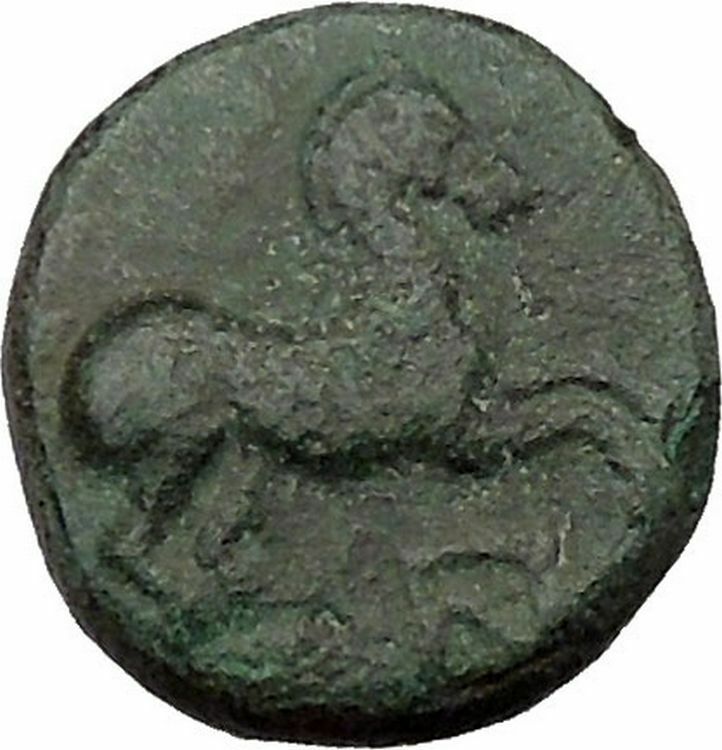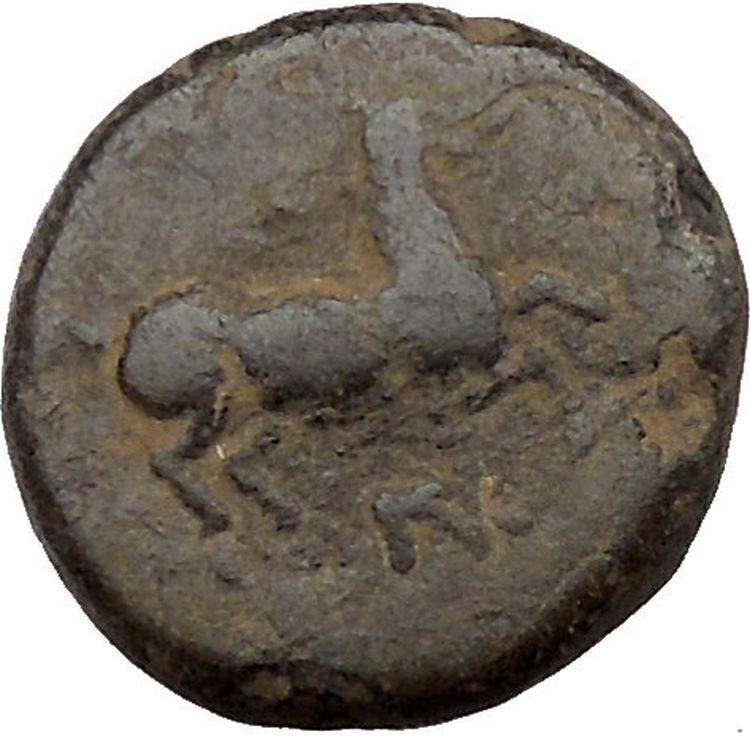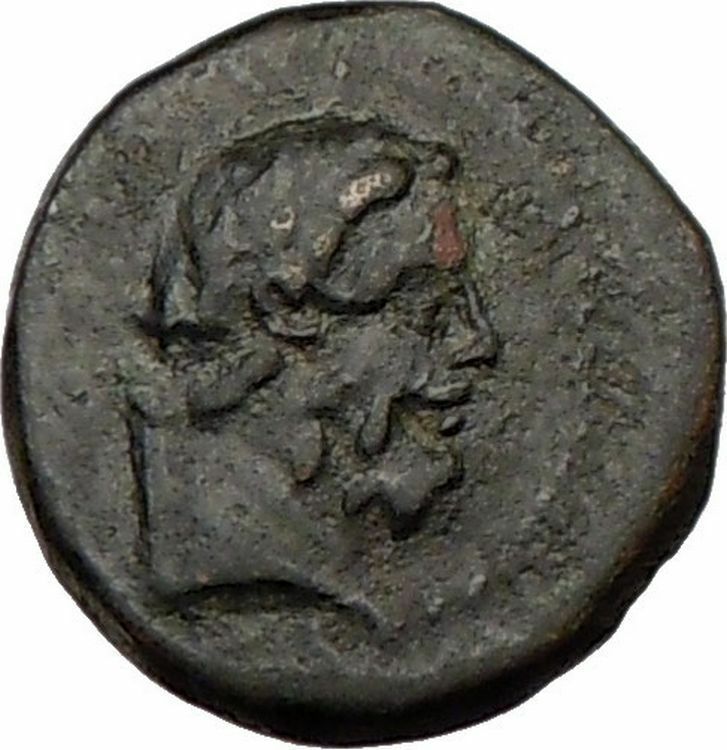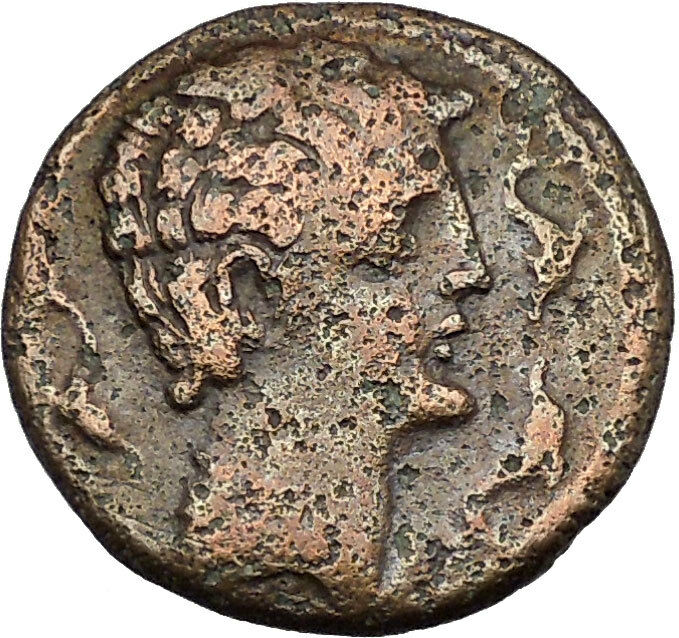|
Greek
Ptolemaic Kingdom of Egypt
Ptolemy II Philadelphos
– King: 285-246 B.C. –
Bronze 17mm (3.89 grams) Tyre mint, circa 276-266 B.C.
Reference: Svoronos 638 var.; Weiser -; SNG Copenhagen 480 var.
Diademed head of Alexander the Great right.
ΠTOΛEMAIOY BAΣIΛEΩΣ, Eagle with open wings
standing left on thunderbolt; (date) and club before.
Son of Ptolemy I, he was made co-ruler by his father two years
before the latter’s death, thus ensuring a smooth succession. His long reign was
a period of growing prosperity for his kingdom, and the capital city of
Alexandria was embellished with many splendid new buildings – the Pharos, the
Museum and the Library being foremost. He was twice married: in circa 288 B.C.
to Arsinoe I, daughter of Lysimachos of Thrace; and about twelve years later to
his own sister, Arsinoe II.
You are bidding on the exact item pictured,
provided with a Certificate of Authenticity and Lifetime Guarantee of
Authenticity.
In the
ancient Greek
religion
,
Zeus
zews
zooss
;
Ancient
was the “Father of Gods and men” (πατὴρ
ἀνδρῶν τε θεῶν τε)
who ruled the Olympians of
Mount Olympus
as a father ruled the family. He was the
god of sky
and
thunder
in
Greek mythology
.
His
Roman
counterpart is
Jupiter
and
Etruscan
counterpart is Tinia
.![The Jupiter de Smyrne, discovered in Smyrna in 1680[1]](https://upload.wikimedia.org/wikipedia/commons/thumb/c/c8/Jupiter_Smyrna_Louvre_Ma13.jpg/200px-Jupiter_Smyrna_Louvre_Ma13.jpg)
Zeus was the child of
Cronus
and
Rhea
,
and the youngest of his siblings. In most traditions he was married to
Hera, although, at the
oracle of Dodona
,
his consort was
Dione
:
according to the Iliad
,
he is the father of
Aphrodite
by Dione. He is known for his erotic escapades. These resulted in many godly and
heroic offspring, including
Athena
,
Apollo
and Artemis
,
Hermes
,
Persephone
(by Demeter
),
Dionysus
,
Perseus
,
Heracles
,
Helen of Troy
,
Minos
,
and the Muses
(by Mnemosyne
);
by Hera, he is usually said to have fathered
Ares,
Hebe
and Hephaestus
.
As
Walter Burkert
points out in his book, Greek Religion, “Even the gods who are not his
natural children address him as Father, and all the gods rise in his presence.”
For the Greeks, he was the
King of the Gods
,
who oversaw the universe. As
Pausanias
observed, “That Zeus is king in heaven is a saying common to all men”. In
Hesiod’s Theogony
Zeus assigns the various gods their roles. In the
Homeric Hymns
he is referred to as the chieftain of the gods.
His symbols are the
thunderbolt
,
eagle
,
bull
,
and oak
.
In addition to his Indo-European inheritance, the classical “cloud-gatherer”
also derives certain iconographic traits from the cultures of the
Ancient Near East
,
such as the
scepter
.
Zeus is frequently depicted by Greek artists in one of two poses: standing,
striding forward, with a thunderbolt leveled in his raised right hand, or seated
in majesty.
Ptolemy II Philadelphus (Greek:
Πτολεμαῖος Φιλάδελφος,
Ptolemaĩos Philádelphos” 309 BC–246 BC), was the king of
Ptolemaic Egypt
from 283 BC to 246 BC. He was the son of the founder of the
Ptolemaic kingdom
Ptolemy I Soter
and
Berenice
, and was educated by
Philitas of Cos
. He had two half-brothers,
Ptolemy Keraunos
and
Meleager
, both of whom became kings of
Macedonia
(in 281 BC and 279 BC respectively). Both died in the Gallic
invasion of 280-279 BC (see
Brennus
).
As did the Ptolemy’s III through V, Ptolemy II erected a
commemmorative stele, the Great Mendes Stela.
//
Reign
He began his reign as co-regent with his father
Ptolemy I
from ca. 290 BC–ca. 283 BCE, and maintained a splendid court in
Alexandria
.
Egypt was involved in several wars during his reign.
Magas of Cyrene
opened war on his half-brother (274 BC), and the
Seleucid
king
Antiochus I Soter
, desiring
Coele-Syria
with Judea
,
attacked soon after in the
First
Syrian War
. Two or three years of war followed. Egypt’s victories solidified
the kingdom’s position as the undisputed naval power of the eastern
Mediterranean; the Ptolemaic sphere of power extended over the
Cyclades
to
Samothrace
,
and the harbours and coast towns of
Cilicia Trachea
,
Pamphylia
,
Lycia
and
Caria
.
The victory won by
Antigonus II Gonatas
, king of Macedonia, over the Egyptian fleet at
Cos (between 258 BC
and 256 BC) did not long interrupt Ptolemy’s command of the
Aegean Sea
.
In a Second Syrian War
with the Seleucid kingdom, under
Antiochus II Theos
(after 260 BC), Ptolemy sustained losses on the seaboard
of
Asia Minor
and agreed to a peace by which Antiochus married his daughter
Berenice
(c. 250 BCE).
Ptolemy’s first wife,
Arsinoë I
, daughter of
Lysimachus
,
was the mother of his legitimate children. After her repudiation he married his
full sister
Arsinoë II
, the widow of
Lysimachus
—an
Egyptian custom—which brought him her Aegean possessions.
Court
The material and literary splendour of the Alexandrian court
was at its height under Ptolemy II. Pomp and splendor flourished. Ptolemy
deified his parents and his sister-wife, after her death (270 BC). Ptolemy
staged a procession in Alexandria in honor of Dionysus led by 24 chariots drawn
by elephants and a procession of lions, leopards, panthers, camels, antelopes,
wild asses, ostriches, a bear, a giraffe and a rhinoceros. According to
scholars, most of the animals were in pairs – as many as eight pairs of
ostriches – and although the ordinary chariots were likely led by a single
elephant, others which carried a 7 foot tall golden statue may have been led by
four.
Callimachus
, keeper of the library,
Theocritus
,
and a host of lesser poets, glorified the
Ptolemaic family
. Ptolemy himself was eager to increase the library and to
patronize scientific research. He had exotic animals of far off lands sent to
Alexandria. Although an enthusiast for Hellenic culture, he also adopted
Egyptian religious concepts, which helped to bolster his image as a sovereign.
The tradition preserved in the
pseudepigraphical
Letter of Aristeas
which connects the
Septuagint
translation of the Old Testament into Greek with his patronage is probably
overdrawn. However, Walter Kaiser says, “There can be little doubt that the Law
was translated in Philadelphus’s time since Greek quotations from Genesis and
Exodus appear in Greek literature before 200 B.C. The language of the Septuagint
is more like Egyptian Greek than it is like Jerusalemite Greek, according to
some.”
Ptolemy had many brilliant mistresses, and his court, magnificent and dissolute,
intellectual and artificial, has been compared with the
Versailles
of
Louis XIV
.
Ptolemy was of a delicate constitution. Elias Joseph
Bickermann (Chronology of the Ancient World, 2nd ed. 1980) gives the date
of his death as January 29.
Relations
with India
Ptolemy is recorded by
Pliny the Elder
as having sent an ambassador named
Dionysius
to the
Mauryan
court at
Pataliputra
in India
, probably to Emperor
Ashoka
:
-
“But [India] has been treated of by several other Greek
writers who resided at the courts of Indian kings, such, for instance, as
Megasthenes, and by Dionysius, who was sent thither by Philadelphus,
expressly for the purpose: all of whom have enlarged upon the power and vast
resources of these nations.” Pliny the Elder, “The Natural History”, Chap.
21
He is also mentioned in the
Edicts of Ashoka
as a recipient of the
Buddhist
proselytism of Ashoka, although no Western historical record of this event
remain.
|





![The Jupiter de Smyrne, discovered in Smyrna in 1680[1]](https://upload.wikimedia.org/wikipedia/commons/thumb/c/c8/Jupiter_Smyrna_Louvre_Ma13.jpg/200px-Jupiter_Smyrna_Louvre_Ma13.jpg)



